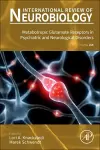
Metabotropic Glutamate Receptors in Psychiatric and Neurological Disorders
2 contributors - Hardback
£145.00
Prof. Lori Knackstedt has a long-standing interest in studying the pathological changes in brain and behavior which occur in response to addictive drugs. For the past nine years, her work has focused on identifying neuroadaptations in the glutamate neurotransmitter system produced by chronic self-administration of addictive drugs such as nicotine, alcohol and cocaine. She then target these neuroadaptations with translational compounds to reduce drug-seeking. To that end, her research involves assessing brain changes in reward circuitry following self- administration of addictive drugs using western blotting, immunohistochemistry, and microdialysis. Prof. Knackstedt began her independent research career as a Research Assistant Professor at the Medical University of South Carolina in 2009. In Fall 2012, she began a tenure-track position in the Psychology Department at UF, where she now run the Neurobiology of Addiction Research Lab. She supervises three graduate students, one post-doctoral fellow and 7 undergraduates. Dr. Schwendt is an Assistant Professor in the Department of Psychology at the University of Florida, Gainesville, FL. His research focuses on psychostimulant induced neuroplasticity underlying persistent drug-seeking and cognitive impairments. Dr. Schwendt completed his M.S. in Comenius University, Bratislava, Slovakia, and his Ph.D. in the Institute of Exp. Endocrinology & University of P.J. Safarik, Bratislava, Slovakia. He completed his Postdoctoral Fellowship in the Medical University of South Carolina, Charleston, SC Dr. Schwendt is interested in what causes drug addiction to be a chronic relapsing disorder. He is interested in identifying cellular and molecular mechanisms underlying relapse and drug-induced cognitive deficits which persist well into abstinence. His research utilizes an animal model with high-face validity for human addiction: operant drug self-administration in combination with tasks designed to test memory performance in animals. In particular, his research attempts to elucidate the role of modulatory proteins that ‘fine-tune’ synaptic transmission during development of drug-induced neural plasticity, and further, to investigate whether in vivo manipulation of these proteins can attenuate or reverse drug-seeking and drug-induced cognitive deficits. Dr. Schwendt believes that characterization of the molecular underpinnings of the long-lasting behavioral consequences of repeated drug administration will provide critical insight into the psychopathology of drug addiction and related psychiatric disorders (including schizophrenia and depression).